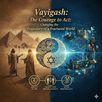Toldot: How To Deal With The Black Sheep In Our Family
- Rabbi Yosef Vogel

- Nov 5, 2021
- 2 min read

We have all read the story. It has made a profound impression upon us. It deeply resonates with us. Yet do we really understand its message?
The story is of twin brothers Jacob and Esau; children of Isaac and Rebecca; grandchildren of Abraham and Sarah.
At the very outset their character is defined: “Esau was a man who knew how to hunt, a man of the field. Jacob was a pure man, dwelling in tents”.
It all seems like a forgone conclusion, each son playing out their character role. Jacob is the ‘good guy.’ The one we would all like to emulate and have our kids follow. Esau on the other hand is the ‘rebellious type’. We tend to shun him. He is the ‘black sheep of the family.’
Life is never what it seems to be. This story certainly isn’t. Besides, do we understand Esau better than our patriarch Isaac? The verse is unequivocal about this: “Isaac loved Esau”.
So what’s going on? What are we missing?
The answer lies in a profound and simple mystical truth. Conventional thinking sees the world as a binary system. They see the world divided by good and evil. Our mission is to be good and do right, whilst avoiding all that is bad for us.
The mystics completely reject this simplistic approach. If G-d is truly both omnipotent and omnipresent, then how could there be a real void in that presence? There must therefore be a redemptive quality in every component of G-d’s creation, including evil.
The creation of dark forces not only has an innate purpose but possess an even greater energy. When fully harnessed by sublimating its raw power, it can reach the greatest heights.
Isaac sees in Esau a unique potential that even Jacob does not possess. He is idealistic and focused on the end game. He knows that the world will not realize its full potential until Esau is on side. He understands that it is only when Jacob and Esau work in cohesion that the Jewish people will fulfil their mission.
The way to achieve this is by recognizing that in fact both Jacob and Esau reside within us. This means that firstly we must acknowledge and fully appreciate our own weaknesses. Once we do this, we can then begin the arduous journey of engaging and refining that raw energy, applying its force to achieve the extraordinary.
At the conclusion of the story of Jacob and Esau, Esau suggests “Let’s set off and we’ll go together”. Jacob responds “Let my master go ahead. And I will move at my own slow pace”. The prophets assure us that Jacob and Esau will indeed meet when the Messiah comes. Our job is to hasten that meeting speedily in our days.






Comments